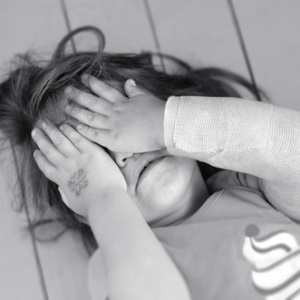
Traumatic events during childhood - as well as growing up with abuse, neglect or a dysfunctional family - may increase the risk of developing high blood pressure later in life, a small study suggests.
Researchers followed about 400 people over more than two decades and found that, after adjusting for socio-economic factors and medical history, those who experienced several extremely stressful events during childhood had a much steeper rise in blood pressure at age 30.
The link doesn't prove that childhood trauma causes adult high blood pressure, but it does raise the possibility that mental health care or stress reduction might play a role in prevention.
"Most previous studies looked at the effect of childhood trauma on adult's health in middle age or older; our finding is significant because for the first time we found that the influence of the adverse childhood experiences on blood pressure could be observed in younger adulthood, around 30 years old," lead study author Shaoyong Su, a researcher at the Medical College of Georgia at Georgia Regents University, said by email.
Read: Childhood trauma linked to adult smoking
How the study was conducted
Su and colleagues recruited children aged 5 to 16 years in 1989 who had no signs of high blood pressure or chronic disease at the time and followed them regularly until 2012. The group included 181 white kids and 213 black children, and 78 of the participants were siblings.
Most of the participants had at least eight blood pressure evaluations during the course of the study, with 13 checkups on average.
After age 18, participants completed questionnaires about their childhood to see if they experienced emotional, physical or sexual abuse, neglect, or household dysfunction such as exposure to mental illness, substance abuse, domestic violence, criminal activity or marital discord.
The researchers tracked both systolic blood pressure, taken when the heart beats, as well as diastolic blood pressure, checked when the heart rests between beats. Blood pressure is measured using a scale called millimeters of mercury (mmHg).
A healthy person will have systolic blood pressure (the top number) of less than 120 mmHg and diastolic pressure (the bottom number) of less than 80mmHg, according to the U.S. Centers for Disease Control and Prevention.
When systolic blood pressure reaches at least 140 mmHg and diastolic reaches at least 90 mmHg, a person is considered to have high blood pressure, also known as hypertension.
Read: Treat hypertension to prevent stroke
High blood pressure is third leading cause of death in U.S
About one third of U.S. adults - or about 70 million people - have high blood pressure, according to the CDC. The condition is a leading cause of death in the U.S. and it increases risk for heart disease and stroke.
It's normal for blood pressure to rise somewhat with age until old age, when it may begin to drop. The steepness, or trajectory, of the rise or fall has been linked to overall health and risk of death.
The researchers estimated that by age 38, participants who experienced at least four traumatic events during childhood had average systolic and diastolic blood pressure levels 9.3 mmHg and 7.6 mmHg higher, respectively, than people who didn't have any trauma growing up.
Exposure to trauma had a similar impact on blood pressure for men and women, as well as for black and white participants.
Read: Black people more prone to hypertension
Limitations of the study
The study is small, and more research is needed in a larger population to more firmly establish a link between trauma and blood pressure, Su said.
Because the study is observational, it can't prove that trauma causes high blood pressure, Dr. Debbie Lawlor of the University of Bristol in the UK and colleagues note in an editorial accompanying the study in the journal Circulation.
Understanding the health consequences of adversity can contribute to prevention efforts and inform interventions designed to avoid harmful health outcomes from childhood trauma, Lawlor and colleagues write in the editorial.
The findings are consistent with other research linking childhood trauma to the development of diseases in adulthood, Dr. Dan Stein, chair of psychiatry at the University of Cape Town in South Africa, said by email.
"I'd suggest that many of the traumas measured in this and previous studies are preventable," said Stein, who wasn't involved in the current study. "But where it has occurred, clinicians should be on the alert for potential physical and mental consequences."
Read more:
Salt may be bad for more than your blood pressure
Poor quality sperm could indicate high blood pressureThe role of diet in managing hypertension
Image: Abused little girl with a broken arm covering here face while crying from Shutterstock




 Publications
Publications
 Partners
Partners











